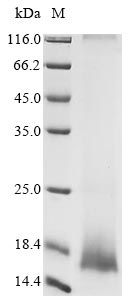The recombinant HCoV-NL63 E protein protein is a cell-free system in vitro E.coli expressed Full Length protein. In cell-free systems, synthesis of the protein can be carried out in vitro using extracts of whole cells that are compatible with translation. These cell extracts contain all the molecules and enzymes that are needed to transcribe, translate, and post-translationally modify the recombinant protein. With additional supplements of cofactors, E protein proteins can be formed in a few hours. However, this system may not be applicable for the large-scale production of recombinant proteins. Advantages of this system include that proteins can be synthesized without cell culturing; also, it is possible to express many proteins together.
The HCoV-NL63 E protein is a small, integral, structural membrane protein found in the lipid envelope of mature virus particles. It functions in various stages of the viral life cycle, such as assembly, budding, envelope formation, and pathogenesis. Absence or inactivation of E protein leads to attenuated viruses because of changes in either virion morphology or tropism. The E protein is abundantly expressed inside the infected cells during the replication cycle, but only a small fraction is integrated into the virion membrane. The majority of the E protein is found in intracellular trafficking sites such as the ER, Golgi, and ERGIC, where it aids in HCoV-NL63 assembly and budding. The E protein also plays an important role in viral production and maturation.






